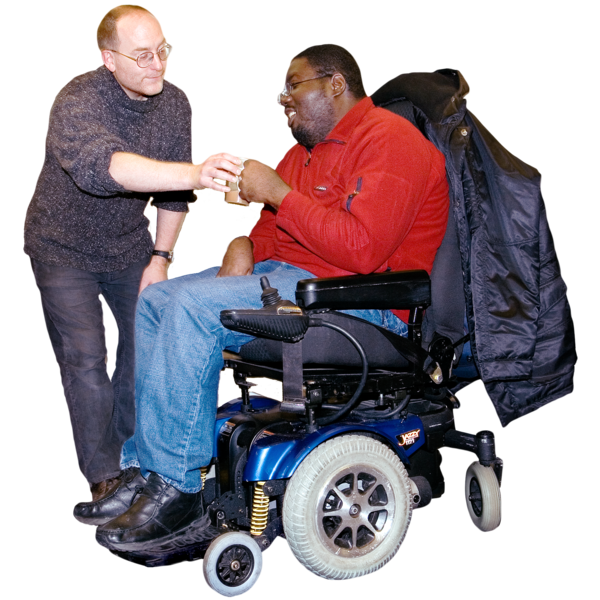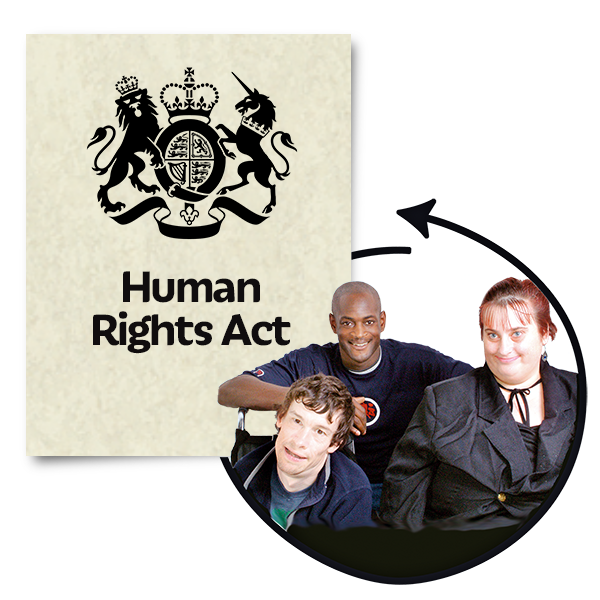Mencap and the
Challenging Behaviour
 Challenging behaviour can be when someone hurts themselves, hits or pinches someone else, or breaks something. Some people might behave like this because they are upset or because people do not understand them.
Foundation call for urgent Cross Government action and investment in
social care
Challenging behaviour can be when someone hurts themselves, hits or pinches someone else, or breaks something. Some people might behave like this because they are upset or because people do not understand them.
Foundation call for urgent Cross Government action and investment in
social care
 Social care means the services that give care and support to people who need it.
to enable children and adults to get the right support in their
community
Social care means the services that give care and support to people who need it.
to enable children and adults to get the right support in their
community
 A community is the people and places in an area.
.
A community is the people and places in an area.
.
- At least 2,185 people with a
learning disability
 A learning disability is to do with the way someone's brain works. It makes it harder for someone to learn, understand or do things.
/
autism
A learning disability is to do with the way someone's brain works. It makes it harder for someone to learn, understand or do things.
/
autism
 Autism is a disability. Autistic people find it difficult to understand what other people think and feel. They also find it difficult to tell people what they think and feel. Everyone with autism is different.
continue to be locked away in inpatient units, of which 1,950 are adults and 235 children
Autism is a disability. Autistic people find it difficult to understand what other people think and feel. They also find it difficult to tell people what they think and feel. Everyone with autism is different.
continue to be locked away in inpatient units, of which 1,950 are adults and 235 children - Little change in the number of admissions - with 100 admissions in January
- Discharge delays continue – 140 people with a learning disability / autism who should be back home in their community
- High number of reported uses of restrictive interventions – 3,500 in one month, of which 805 were against children. This is likely to be just the “tip of the iceberg” as only data for 3 out of 18 private/independent providers and 28 out of 54 NHS providers.
- The average total length of stay in in-patient units remains at 5.4 years.
According to data released today from NHS Digital, 2,185 people with a learning disability and/or autism remain locked away in inpatient units, no reduction on last month’s data. 1,950 adults and 235 children continue to be locked away.
Little change in the number of admissions with 100 people admitted in January alone. While 140 people remained in hospital when they are ready for discharge, with the main reasons being a lack of social care and housing provision in the community.
There is still no robust cross-government
strategy
 A strategy is a plan to show what an
organisation
A strategy is a plan to show what an
organisation
 An organisation are a group of people who work together.
, or a person, wants to do and how they are going to do it.
to ensure that health, social care,
education
An organisation are a group of people who work together.
, or a person, wants to do and how they are going to do it.
to ensure that health, social care,
education
 Education is when you learn things. When you fill in a form to get a job, education means you write where you went to school, college or university.
and housing work together to stop inappropriate admissions and get people out of inpatient units.
Education is when you learn things. When you fill in a form to get a job, education means you write where you went to school, college or university.
and housing work together to stop inappropriate admissions and get people out of inpatient units.
Dan Scorer, head of policy and public affairs at the learning disability charity Mencap, said:
“This national scandal has been allowed to continue for far too long. Today’s NHS Digital figures indicate that the government and NHS England are set to miss yet another deadline whilst over 2,000 children and adults with a learning disability and/or autism remain locked away in these ‘modern day asylums’ at risk of abuse and neglect.
“These latest figures come just one week after the
Equality
 Equality is when everyone is treated fairly.
and
Human Rights
Equality is when everyone is treated fairly.
and
Human Rights
 Human
rights
Human
rights
 Rights are the things everyone should be allowed to do like have a say, or go to school.
are the rights that everyone has. These include the right to go to school and the right to start a family.
Commission threatened legal action against the Health Secretary over the government’s repeated failure to stop
human rights
Rights are the things everyone should be allowed to do like have a say, or go to school.
are the rights that everyone has. These include the right to go to school and the right to start a family.
Commission threatened legal action against the Health Secretary over the government’s repeated failure to stop
human rights
 Human
rights
Human
rights
 Rights are the things everyone should be allowed to do like have a say, or go to school.
are the rights that everyone has. These include the right to go to school and the right to start a family.
abuses in in-patient settings. The government must now deliver on its broken promises and develop the community services needed up and down the country so people who have been locked away for years can get out of these ‘modern day asylums’ and back home, close to their loved ones, with the care and support they deserve. The new Chancellor must use his first
budget
Rights are the things everyone should be allowed to do like have a say, or go to school.
are the rights that everyone has. These include the right to go to school and the right to start a family.
abuses in in-patient settings. The government must now deliver on its broken promises and develop the community services needed up and down the country so people who have been locked away for years can get out of these ‘modern day asylums’ and back home, close to their loved ones, with the care and support they deserve. The new Chancellor must use his first
budget
 A budget is a plan where you look at how much money you have and how you will spend it.
to announce a much needed emergency injection of cash into our social care system so that people with a learning disability and/or autism can get the support in their communities that they need. This will only happen when there is investment in the system and Government departments – health, housing, education and social care – are all working together to deliver a sustainable infrastructure of care. People with a learning disability and/or autism deserve to live in homes, not hospitals.”
A budget is a plan where you look at how much money you have and how you will spend it.
to announce a much needed emergency injection of cash into our social care system so that people with a learning disability and/or autism can get the support in their communities that they need. This will only happen when there is investment in the system and Government departments – health, housing, education and social care – are all working together to deliver a sustainable infrastructure of care. People with a learning disability and/or autism deserve to live in homes, not hospitals.”
Vivien Cooper OBE, CEO of the Challenging Behaviour Foundation, said: “Children and adults with learning disabilities and autism remain in inappropriate services, often far from their homes, because the Transforming Care programme has not delivered what was promised in 2012. These individuals and their families are living with the consequences of this failure, as highlighted by today’s data showing that incidents of restrictive interventions have increased, with 805 incidents on under 18s, including 80 incidents of prone restraint.
“It is clear that another target – set by the government itself, and the lowest end of it – will be missed again. In light of recent legal challenge by EHRC against the Department of Health and Social Care, it is time for a new approach, focussed on investment in community support and action to protect the human rights of children, young people and adults with learning disabilities and autism.”
- Ends –
For further information or to arrange interviews, contact Mencap’s media team on:
- media@mencap.org.uk
- 020 7696 5414 (including out of hours).
Notes to editors
- Mencap and The Challenging Behaviour Foundation have been campaigning with families on these issues since the abuse scandal at Winterbourne View eight years ago.
- The Assuring Transformation data from NHS Digital is the most accurate and up to date account of people with a learning disability and autism in institutions. It is a record of how many are in an institution, how long they have been in for, when their care and treatment is checked and what kind of unit they are in. Latest data shows that numbers have fallen from 2,260 at the end of March 2019 to 2,185 at the end of January 2019: https://digital.nhs.uk/data-and-information/publications/statistical/learning-disability-services-statistics/at-january-2020-mhsds-november-2019-final
- Figures for restrictive practices quoted from NHS Digital MHSDS Data: November 2019, published February 2020. For more information: https://digital.nhs.uk/data-and-information/publications/statistical/learning-disability-services-statistics/at-january-2020-mhsds-november-2019-final
- In the tables for restrictive practices we cannot distinguish between ‘less than 5’ and ‘missing data’, so we have to treat this all as missing data.
- Mencap and CBF are asking the Government to focus on:
- Developing local expertise, support and services
- Ensuring there is joint oversight and ownership of the national programme by the Ministers from the Department of Health and Social Care, Department of Housing, Communities and Local Government and Department for Education.
- Removing the red tape and funding barriers that are preventing so many people from returning home.
- There remains no robust plan from leadership for cross-government working.
About Mencap
There are 1.5 million people with a learning disability in the UK. Mencap works to support people with a learning disability, their families and carers by fighting to change laws, improve services and access to education,
employment
 Employment means having a job.
and
leisure
Employment means having a job.
and
leisure
 Leisure is when you have time to do things you enjoy like playing sports or going to the pub.
facilities. Mencap supports thousands of people with a learning disability to live their lives the way they want. Visit www.mencap.org.uk.
Leisure is when you have time to do things you enjoy like playing sports or going to the pub.
facilities. Mencap supports thousands of people with a learning disability to live their lives the way they want. Visit www.mencap.org.uk.
For advice and information about learning disability and Mencap services in your area, contact Mencap’s Freephone Learning Disability Helpline on 0808 808 1111 (9am-3pm, Monday-Friday) or email help@mencap.org.uk.
What is a learning disability?
- A learning disability is a reduced intellectual ability which can cause problems with everyday tasks – for example shopping and cooking, or travelling to new places – which affects someone for their whole life;
- Learning disability is NOT a mental illness or a learning difficulty, such as
dyslexia
 Dyslexia is a learning difficulty. People who have dyslexia can find it hard to read, write and spell.
. Very often the term ‘learning difficulty’ is wrongly used interchangeably with ‘learning disability’;
Dyslexia is a learning difficulty. People who have dyslexia can find it hard to read, write and spell.
. Very often the term ‘learning difficulty’ is wrongly used interchangeably with ‘learning disability’; - People with a learning disability can take longer to learn new things and may need support to develop new skills, understand difficult information and engage with other people. The level of support someone needs is different with every individual. For example, someone with a severe learning disability might need much more support with daily tasks than someone with a mild learning disability.
About The Challenging Behaviour Foundation
The Challenging Behaviour Foundation (CBF) is a charity which exists to demonstrate that individuals with severe learning disabilities whose behaviour challenges can enjoy ordinary life opportunities when their behaviour is properly understood and appropriately supported.
The CBF supports families across the UK caring for individuals with severe learning disabilities. Information and support around understanding challenging behaviour and supporting behaviour change is provided through a range of written and DVD resources, email networks, family linking scheme, and through individual telephone support.
For more information about the CBF’s work on restraint and seclusion:
- Visit https://www.challengingbehaviour.org.uk/driving-change/restraintandseclusion.html)
- Visit www.challengingbehaviour.org.uk
- Email info@thecbf.org.uk
- Phone 01634 838739.